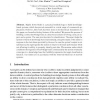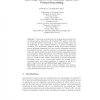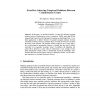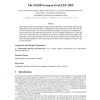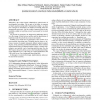136
click to vote
ICSOC
2004
Springer
15 years 7 months ago
2004
Springer
Service oriented computing, with its aim of unhindered interoperability, is an appropriate paradigm for ad hoc networks, which are characterized by physical mobility of heterogeno...
137
click to vote
EKAW
2004
Springer
15 years 7 months ago
2004
Springer
Abstract In this paper we describe a general logic-enabled Formal Concept Analysis (FCA) approach to manage patient record instances. In particular, the conceptual model of the dom...
120
click to vote
EKAW
2004
Springer
15 years 7 months ago
2004
Springer
The manual development of large knowledge systems is a difficult and error-prone task. In order to facilitate extensions to an existing knowledge base the structural design of the...
107
click to vote
ECAI
2004
Springer
15 years 7 months ago
2004
Springer
Many approaches have been proposed for reasoning based on conflicting information in general and in particular on stratified knowledge bases, i.e. bases in which all pieces of i...
103
click to vote
DIS
2004
Springer
15 years 7 months ago
2004
Springer
Abstract. Ripple Down Rules is a practical methodology to build knowledgebased systems, which has proved successful in a wide range of commercial applications. However, little work...
121
click to vote
SAC
2004
ACM
15 years 7 months ago
2004
ACM
Abstract. We describe an architecture for building speech-enabled conversational agents, deployed as self-contained Web services, with ability to provide inference processing on ve...
MICAI
2005
Springer
15 years 7 months ago
2005
Springer
In this paper, we describe EventNet, a toolkit for inferring temporal relations between Commonsense events. It comprises 10,000 nodes and 30,000 temporal links mined from the Openm...
118
click to vote
CLEF
2005
Springer
15 years 7 months ago
2005
Springer
This paper describes our participation at the GeoCLEF 2005 task. We detail the main software components of our Geo-IR system, its adaptation for the participation at GeoCLEF and d...
101
click to vote
KCAP
2005
ACM
15 years 7 months ago
2005
ACM
Effective reuse of Knowledge Bases (KBs) often entails the expensive task of identifying plausible KB-PS (Problem Solver) combinations. We propose a novel technique based on Const...
118
click to vote
WIKIS
2006
ACM
15 years 8 months ago
2006
ACM
Wikipedia is the world’s largest collaboratively edited source of encyclopaedic knowledge. But in spite of its utility, its contents are barely machine-interpretable. Structural...

